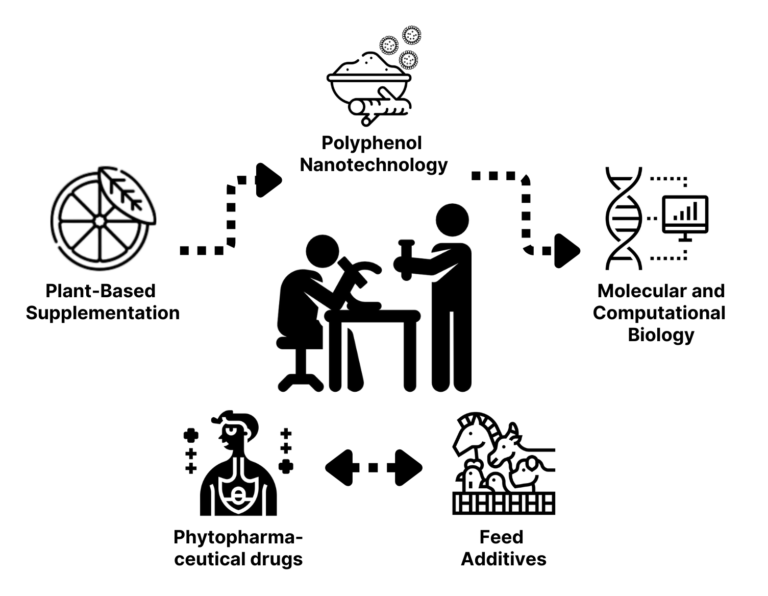
1. Curcumin; An effective therapeutic agent against cancer and inflammation, and emerging feed for livestock and poultry animals.
Curcumin from rhizomes of the turmeric (Curcuma. spp) has preventive and therapeutic effects on various human diseases. Also, it is recently being increasingly preferred by animal nutritionists as an alternative to chemical additives such as chemotherapeutic drugs and antibiotics in animal feed. However, its low water solubility and bioavailability, and rapid metabolism are major drawbacks to its successful applications. Hence, our lab aimed to enhance curcumin’s biological and pharmacological activity and overcome its drawbacks with efficient delivery systems, particularly nanoencapsulation. Thus, we are synthesizing the different curcumin nanoformulations and investigating their therapeutic benefits against inflammation, cancers, and diabetes using invitro and invivo models. In addition, we also using them as feed additive instead of antibiotics and studying the growth performance, digestibility, and immunity in pigs.
2. Citrus unshiu peel; A natural feed additive for improve the growth performance and disease resistance of pigs
Mandarin orange (Citrus unshiu) is one of the important fruits widely cultivated in Jeju Island, South Korea. Citrus peels account for nearly half of the fruit body in citrus fruits and are the main waste part used to produce a vast amount of by-products. It possesses many biologically active compounds, including flavonoids, phenolic acids, vitamin C, fiber, and many nutrients. Pig husbandry is a profitable occupation, especially for small and marginal farmers in Jeju Island. However, one of the most significant problems is the high cost of feeds and their additives. Orange peels are likely to be a balanced diet for improving the growth of pigs but also at increasing the resistance to diseases and overall health condition of pigs. They are stated to be potential functional feed stuff for pigs. Therefore, we have characterized the biological compounds from orange peel and confirmed their biological effects in suitable invitro and invivo models. Currently, we are investigating the orange peel beneficial effects in terms of growth performance, digestibility and immunity in weaner pigs
3. Green synthesis of selenium nanoparticles and its synergistic effects with curcumin in monogastric animals
Selenium nanoparticle (SeNP) is one of the most important and widely used nanomaterials in biomedical applications. There are a lot of research works that have been conducted based on inorganic sources of selenium nanoparticles, however, very few studies have reported on the green or organic synthesis of SeNP, which are less toxic compared to inorganic sources of selenium. For this, our lab aimed to produce SeNP using green technology. Soybean sprouts are short-lived and easy to cultivate. They are easy to grow in a short time regardless of season and place. They are economical because they are inexpensive, and they are popular with nutritionally excellent sources of protein, vitamins, and minerals. In our lab, we are working on the production of SeNP selenium nanoparticles with the addition of soybean sprout as a capping agent and ascorbic acid as a reducing agent. Furthermore, we are also checking the synergistic effects of SeNP with or without the presence of curcumin nanospheres in monogastric animals
